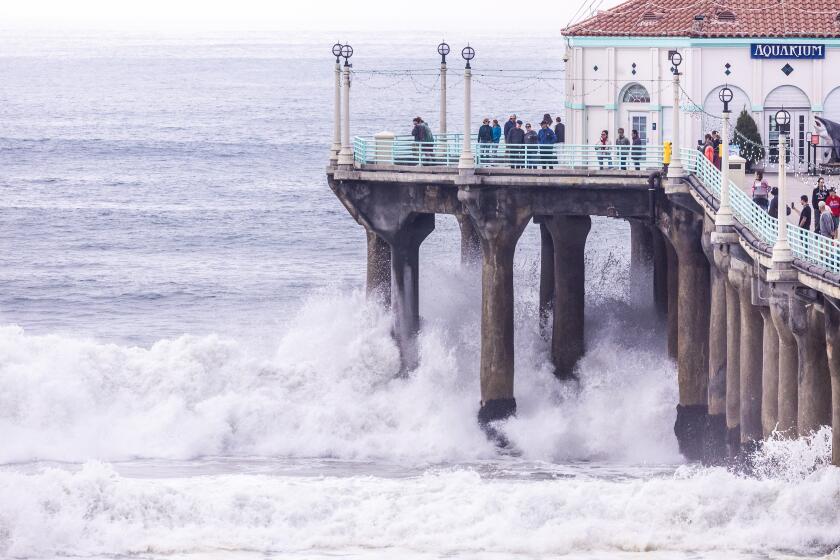THE CALIFORNIA DROUGHT : L.A. Ready to Battle San Diego Over Water : Conservation: DWP officials weigh legal action as southern neighbor refuses to impose rationing while exceeding its February goal by 46%.
SACRAMENTO — Rankled by San Diego’s failure to impose mandatory water rationing, angry Los Angeles officials are threatening a variety of retaliatory moves, including some that could have far-reaching effects on the way water is distributed in Southern California.
In what is shaping up to be the first intercity water battle induced by California’s fifth year of drought, the president of the Los Angeles Department of Water and Power board said Thursday that he is considering whether to propose several options to force San Diego to curb its thirst for water.
“It’s just troublesome that some people apparently don’t have the message yet that we generally need to all cooperate to conserve,” Michael Gage said. “If all of us were to undertake the same behavior as the San Diego County Water Authority we’d all be out of water pretty soon.”
But San Diego Mayor Maureen O’Connor, who has refused to call for mandatory rationing, insisted that her city was doing its part and could not understand why Los Angeles was trying to pick a fight.
“We didn’t start it. We are not pitting ourselves against Los Angeles,” O’Connor said in an interview. “We are the second-largest city in the state. What do they want us to do? Let San Diego burn? I hope not.”
Gage’s anger was touched off by disclosures last week from the Metropolitan Water District that in February the San Diego authority had exceeded the conservation goals set by the giant water wholesaler by 46%. While Los Angeles was establishing a harsh rationing program and cutting back sharply on its water purchases from the MWD, the district’s survey showed that San Diego was exceeding its allotment and racking up penalties of $4.6 million.
Faced with a cutoff of water deliveries from the state and forced to rely almost exclusively on water from the Colorado River, the MWD had instituted a conservation program in February aimed at reducing consumption by 17%. To reach that goal, a water usage target was set for each of its member agencies with the understanding that those overshooting their targeted allotments would be penalized while those that saved water would receive monetary rewards.
For Los Angeles officials who were coping with the first consumer grumbling over mandatory rationing, their southern neighbor’s performance was particularly nettlesome.
“I’m not sure why San Diego--both the city and to some extent the county district--continues to ignore that rationing is a reality and continues to consume far more than is a reasonable allocation for them at this point,” Gage said.
With water supplies dwindling, Gage said, Los Angeles should not sit by and let San Diego gobble up a disproportionate share of the water. Among the options open to Los Angeles, he said, is legal action challenging MWD’s water allocation program.
Such an action might attempt to force the MWD to adhere strictly to a water-rights formula of distribution--which, incidentally, would greatly favor Los Angeles over San Diego.
Known as the “preferential rights doctrine,” water agencies’ entitlement to MWD water is based on a legal formula that takes into account the taxes each agency has contributed to MWD over a period of time. Under that computation, Los Angeles, which has been paying taxes to the MWD since 1928, is entitled to 25.83% of the water, while San Diego, a taxpaying member since 1941, is entitled to only 12.08%.
But because Los Angeles has other sources of water, it has always taken less than its entitled amount, while San Diego, which gets 90% to 95% of its water from the MWD, has purchased more.
MWD General Manager Carl Boronkay acknowledged that the amount currently allotted to each agency is not based on individual entitlements but on the amount of MWD water used in a normal year. He conceded that a court challenge could upset the distribution system.
If such a challenge were successful, the greatest impact would be on the millions of consumers who live in Los Angeles and San Diego, the heaviest water users. The impact on smaller agencies would be less significant.
“The approach we have taken as the MWD staff is to try to manage the water and equably distribute it,” he said. “We have never been forced into this very difficult question of shares.”
Gage said that Los Angeles would prefer means other than legal action, but that the course it takes will depend on what is determined to be “the most effective, the fastest and the fairest.” He said he hoped there could be discussions with San Diego before Los Angeles makes any final decision. Another option is to follow San Diego’s example and take more water than its allotment even though it means paying penalties.
“None of us object to San Diego getting more than its entitlement,” Gage said. “We all recognize their special circumstances, but it is the extraordinary excess beyond those special circumstances that I find offensive.”
Gage said he was puzzled as to why O’Connor has worked so hard to resist a mandatory rationing program during a drought. “I’ve always kind of liked her,” he said, “(but) I don’t know where she’s going on this one.”
O’Connor, however, said she was confident that San Diego citizens would uphold her trust in their ability to conserve without the threat of a mandatory rationing program with penalties.
So far in March, San Diego had saved 35% over the amount of water it used during the same period last year, while Los Angeles had only saved 26%, she said.
“I’m tired of everybody saying ‘Well, L.A. is doing X’,” she told the San Diego County Water Authority Board on Thursday. “I can’t wait to come back again and report to you that we beat L.A.”
“God bless her,” Gage retorted. “She’s talking about the first week of March. That was the rainiest week we’ve had so far.”
Times staff writer Amy Wallace contributed to this story from San Diego.
More to Read
Sign up for Essential California
The most important California stories and recommendations in your inbox every morning.
You may occasionally receive promotional content from the Los Angeles Times.










